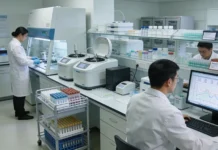A legislation to decentralize personalized drug manufacturing in UK has been passed, enabling them to be prepared across facilities, which are closer to the patient.
This recent legislation, which has been passed, which is the Human Medicine Regulations 2025, goes on to make the UK the first country throughout the world to come up with a dedicated legal framework when it comes to medicines that are to be made at the point of care. Presented by the Medicines and Healthcare Products Regulatory Agency (MHRA), it will help the patients to get personalized treatments made at their hospitals, clinics, or even nearby their homes. Therapies are at present manufactured in laboratories, which happens to extend the vein-to-vein timeframe because of shipping needs.
Interestingly, the framework happens to include the manufacturing of cell and gene therapy, 3-D printed products, blood products, and tissue engineering treatments, along with medicinal gases.
All this will reduce the time for a patient in order to receive customized therapy by almost months, as stated by Wes Streeting, the UK health and social care secretary.
He further said that this world-first legislation happens to be a game changer for patients, and the cancer treatments are going to be tailored in days and not months. These are the life-saving therapies, which are made at the bedside and not miles away.
By way of speeding up the manufacturing time when it comes to CAR-T therapies, it can decrease the instances where patients become too unwell in order to receive therapy. There are times when the short shelf life of the medicine would mean that by the time they get delivered to the patient, they could not be administered.
The legislation also goes on to support the usage of mobile manufacturing units, thereby offering close-to-home treatments for patients who are too unwell to travel or who have a weakened immune system, which means that the hospital visits would mean extra risk.
The chief executive of Cell and Gene Therapy Catapult, Matthew Durdy, said that this transition goes on to demonstrate how MHRA is indeed leading the commitment to decentralize personalized drug manufacturing in UK so that the country is at the forefront when it comes to modern healthcare, regulation, and even innovation. The MHRA has already recognized that there are some practices that are better with more agility and that in the tech-enabled world, which enables training, flexibility, and information and communication, can be very well taken into account without compromising on any kind of safety.
He added that this is not only a step forward for innovative medicines like cell and gene therapy, but it is also a step towards a truly personalized medicine scenario. According to him, they do applaud this transition, which is introduced by the MHRA, and even look forward to a future wherein there are more patients who can receive therapeutics that are customized to their requirements in a much quicker and more cost-effective as well as sustainable way.
It is worth noting that decentralizing the manufacturing has, in the past, been seen as an up-and-coming development within the cell and gene therapy sector because of the high setupcost that has been associated with the processes.
Interestingly, the new legislation happens to be a part of the NHS 10-year plan, which has been announced by Streeting along with Keir Starmer, the UK Prime Minister.



















